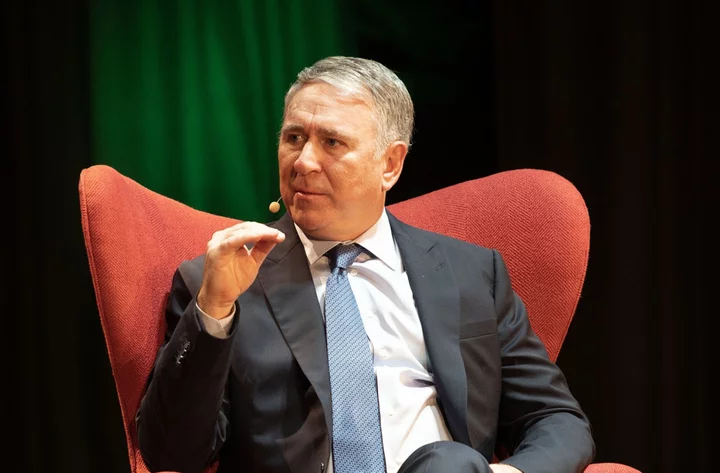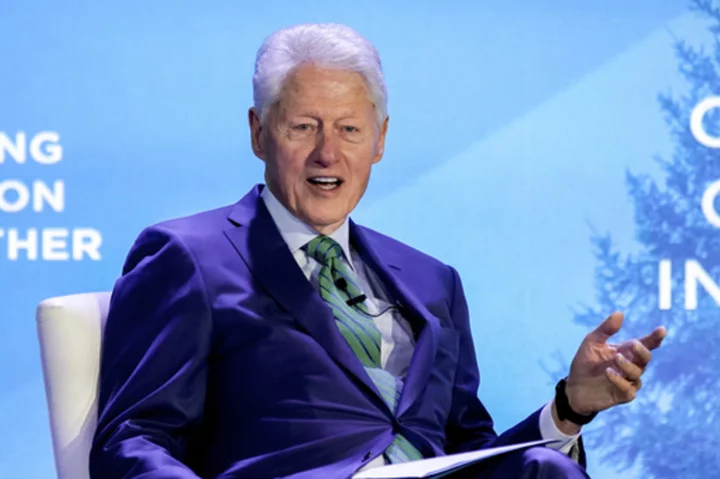Ken Griffin, whose hedge fund churned out a record $16 billion for clients last year, is increasing his focus on credit trading as he braces for a potential US recession.
“We’re much more cautious about 2024,” the billionaire founder of Citadel said in an interview in Hong Kong, referring to his outlook for the world’s largest economy. “We’ll look at the credit markets as a source of opportunity. Credit should be a meaningful contributor later this year” and next for Citadel, he said.
Griffin said his hedge fund is particularly focused on the high-yield credit market, with a mixture of long and short strategies. He expects the US Federal Reserve to raise interest rates one more time this year and then pause hikes for an extended period of time.
Citadel’s flagship Wellington fund returned 6.1% this year through the end of May, according to people familiar with the matter who asked not to be named discussing private information. The firm’s equities, fixed income & macro, commodities, quant and credit strategies all delivered positive returns last month, the people said.
The Citadel Equities fund gained 7.3% through May, with a 1.2% return last month, the people added. Its Tactical Trading fund rose 7.1% in the five months and the Global Fixed Income fund was up 3%.
China, AI
Griffin is more upbeat on China, where he expects economic growth to surpass the government’s targets even though there’s a lack of confidence among investors.
“There’s a general level of uncertainty as to the level of growth in China today,” he said. “We’re actually more constructive on growth and a bit north” of forecasts for a 5% expansion.
Investor sentiment about the world’s second-largest economy has turned increasingly bearish, with Tuesday’s interest rate cut drawing little enthusiasm from equity traders.
Citadel remains interested in China for the long-term, Griffin said. “Irrespective of who’s the US president in the next cycle, I don’t think that’s going to change Citadel’s strategy” in China, he said. “The scale and scope of the Chinese equity market is incredibly attractive to us as investors.”
Griffin said generative artificial intelligence is transforming finance, and improving the productivity of investment professionals and software engineers. People need to be trained for the new wave of innovation to prepare for adverse effects on the job market, he said.
“It’s unbelievable how enthralled people are by generative AI,” Griffin said. “Historically, technological innovation has led to the creation of more jobs. The issue is how will these technologies adversely impact certain sectors of the economy and certain types of jobs disproportionately.”
At Citadel, the firm will use generative AI to help software developers become more productive with programs including Microsoft Copilot.
However, Griffin said the current generation of large language models will “not yet make a meaningful impact” on Citadel’s trading strategies.
Asia Opportunities
In his first trip to Hong Kong since the pandemic, Griffin met with the chief executive of the Hong Kong Monetary Authority and the CEO of the Securities and Futures Commission to discuss the city’s future as an international financial hub. He said the regulators were committed to “encourage capital formation and participation by both domestic and foreign firms.”
His companies snapped up extra office space in the city last year for an expanding team, even as other financial firms retreated during Covid lockdowns and political tightening.
The company is waiting for regulatory approval to set up hedge fund operations in Japan. It’s planning to move some existing talent to Japan but will also hire locally.
“In the long run, our teams are built with local talent,” Griffin said.









